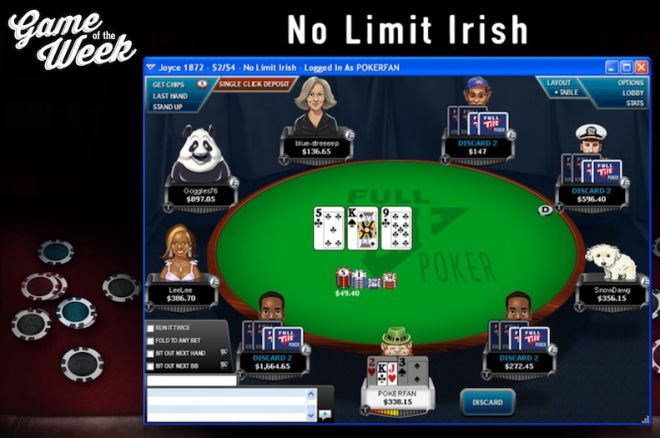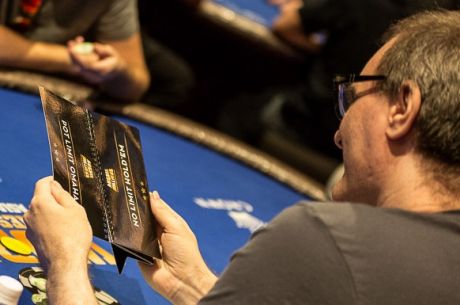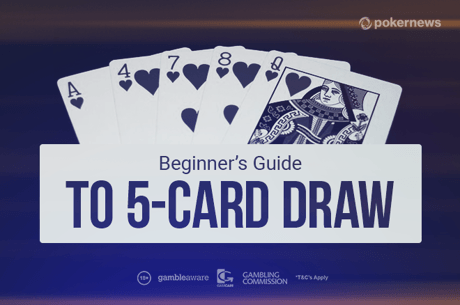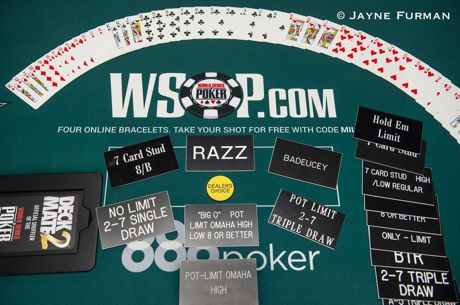Choosing Your Discards in No Limit Irish

No Limit Irish is the ��Game of the Week�� right now through to Sunday at Full Tilt, and if you aren��t familiar there are some interesting strategic considerations about which cards to discard after the flop betting round finishes.
To catch you up briefly on how to play No Limit Irish (the NL version of ��Irish Poker��), you begin with four cards, but after the flop betting sadly have to pitch two of them. From there the game plays out exactly as it would in NLHE.
Starting Hand Selection
Unfortunately many backdoor flush draws are going to be lost to the ether in Irish because you can��t hold such equity in reserve as you would in other Omaha variants. The combinatorics of the game are such that one can choose six two-card hold��em hands from four cards, but unlike in Omaha you have to commit to that one two-card hand before you get to see the turn or river.
Let��s take A?K?Q?9? to gain a better handle on the combinations of starting hand selection.
Our six possible hands are:
- A?K?
- A?Q?
- A?9?
- K?Q?
- K?9?
- Q?9?
It is a bit of theory that the frequency with which one can use any combination will correlate to the strength of one��s hand in some way. So for example, the K?9? combination here is conspicuous, as there are very few flops one would keep these two cards on, suits being equal.
QxJx10x obviously is A?K?��s flop. Any 9xXxXx or 9x9xXx flop will be the province of A?9?.
So really a Kx9xXx flop is going to be necessary to play the K?9? combination (presuming it isn��t KxQx9x! �� so specific indeed). In a way, then, we can think of a hand like A?K?Q?9? as a five combination hand, while, say, J?10?9?8? is clearly a six combination one.
Disconnecting from Omaha
Disconnected connectors like K?Q?8?7? are comparatively stronger in NL Irish than in pot-limit Omaha. While in PLO a hand like J?10?9?8? can flop so much power, the connection is lost mightily on a flop like 9x8x4x in Irish since one must at that point make a Sophie��s choice between 9?8? and J?10?.
Thus the K?Q?8?7? hand in Irish is more potent, both since its board coverage is greater and because it does not remove any cards from the deck that it wishes to see �� i.e., the Jx, 10x, and 9x are not blocked by K?Q?8?7?, but they are by J?10?9?8?.
In essence the connection of rundowns�� equity is preserved in pot-limit Omaha, but is not in NL Irish, so rundowns are enfeebled. This is even further true for Q?J?10?5?-type hands. In Omaha you can keep a three-card rundown, but in Irish you cannot, so Q?J?10?5? becomes a four combination hand (Q?J?, J?10?, Q?10?, Q?5?). In other words, trash.
Pitching Cards
Let��s say you have one of the type of hands to which I referred above, say Q?J?7?6?, and the flop comes 7?4?3?. I would argue that in almost all cases our choice here is for 7?6?.
What can Q?7? do that 7?6? cannot? Whatever it is, it is negligible. Consider when a kicker might play. A kicker will play in NL when someone else also has top pair. In a multi-way pot it will not even be close between Q?7? and 7?6?, but even heads-up the contest is not as close as you might think.
Consider if your opponent keeps a 7x after discarding, so that kickers might matter. That means your opponent has three other cards to pair with that seven. The odds are one of these cards will be an Ax, Kx, Qx, 7x, 4x, or 3x. In other words, a queen-kicker is bunk.
Now you say, this is supposed to be a strategy article, not a litany of the obvious.
Consider the case of the Ax7x3x flop where you hold A?Q?8?6?.
In NL Irish you can play just one card at showdown, remember, just like in NLHE (but not like PLO). This means that actually A?6? is the combination to choose here, again almost irrespective of your situation. (I say ��almost�� partially since some discard situations will depend on villain discard tendencies.)
This is to say that the difference between hitting a second pair with A?Q? versus A?6? when added with the difference between having a queen-kicker or a six-kicker at showdown is not greater than the value of hitting a backdoor straight some amount of the time.
Again, if your opponent keeps an ace in hand, it is likely that one of the other three cards will be from the set of Ax, Kx, Qx, 7x, and 3x.
Succinctly, your ace is most powerful when your opponent doesn��t hold one, and your six is more powerful than a queen when your opponent does.
More Irish at Full Tilt
We are just dipping our toes into the strategy that unravels from what appears to be a game quite close to the ones you already know and love.
If you play No Limit Irish during this week and weekend, you��ll receive double Full Tilt points along the way. There are also specific ��Game of the Week�� tournaments like the Big Game of the Week ($100 buy-in, $8,000 guarantee) and the Little Big Game of the Week ($5 buy-in, $2,000 guarantee) on Sunday which are not only fun, but �� not to speak too out of turn �� do not attract the stiffest competition.
For more on this week��s ��Game of the Week�� at Full Tilt, see ��Learning No Limit Irish�� on the Full Tilt Blog.
Gareth Chantler is a professional poker player who encourages you to check out the interviews, videos, promotions, and strategy articles at the Full Tilt Blog.
Get all the latest PokerNews updates on your social media outlets. Follow us on Twitter and find us on both Facebook and Google+!








